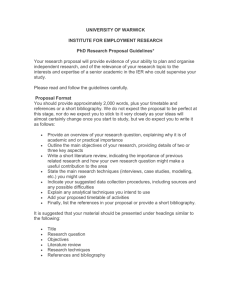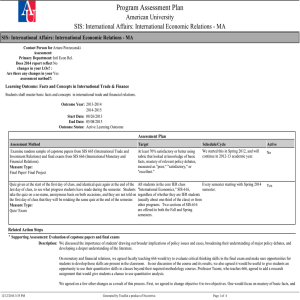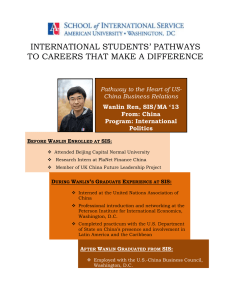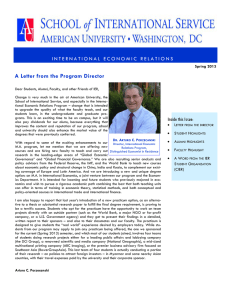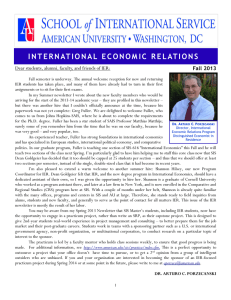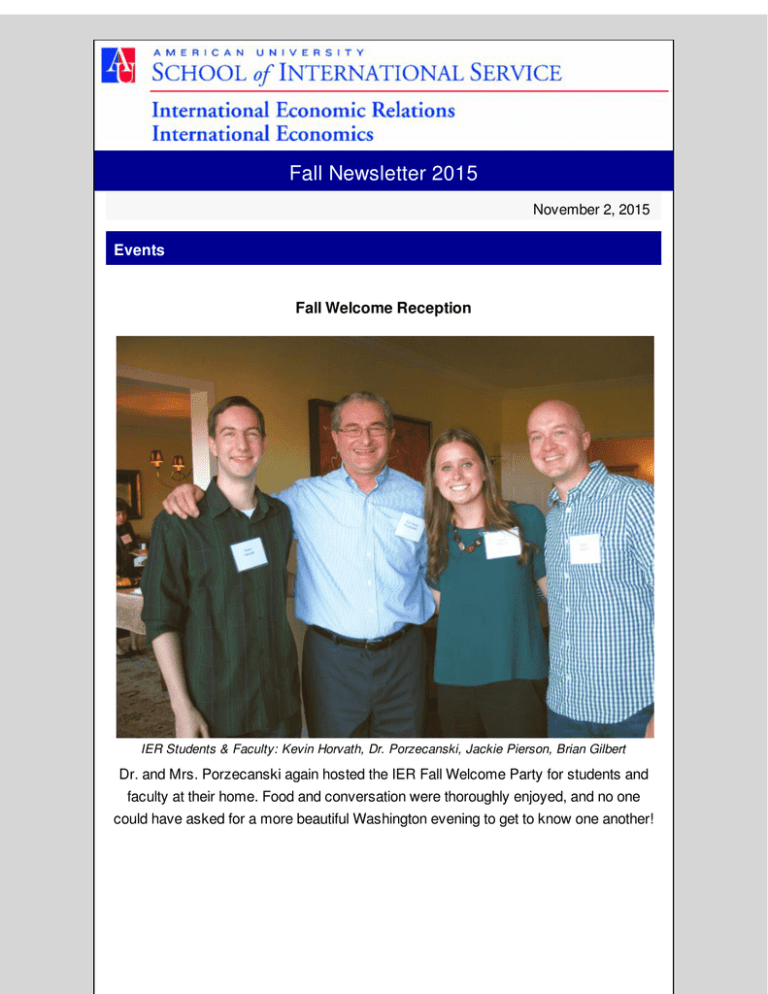
Fall Newsletter 2015
November 2, 2015
Events
Fall Welcome Reception
IER Students & Faculty: Kevin Horvath, Dr. Porzecanski, Jackie Pierson, Brian Gilbert
Dr. and Mrs. Porzecanski again hosted the IER Fall Welcome Party for students and
faculty at their home. Food and conversation were thoroughly enjoyed, and no one
could have asked for a more beautiful Washington evening to get to know one another!
IER Students: Daina Spencer, Rochelle Osei-Tutu, CIER president Sudhanshu Neema
Alumni Profiles
Elizabeth (Liz) Diebold, IER
'09
Liz has been developing expertise in the
interplay of agriculture and finance in the
emerging markets, learning about business
strategies and investment outcomes,
supply chains that reach the bottom of the
social pyramid, and what it takes to
engender bottom-up economic
development.
She has been working for the U.S. Agency
for International Development (USAID) ever
since graduating from the IER program.
Early on, she was a Presidential
Management Fellow and then became an
international business specialist, and by now she is the lead officer in agriculture
investment and finance at USAID's Bureau for Food Security (BFS). The Bureau
leads the Feed the Future initiative, which strives to increase agricultural production
and incomes in rural areas mainly in Africa. It leverages the strengths of other U.S.
government partners, multilateral institutions, NGOs, the private sector and others to
support country-driven strategies, and invests in strengthening the public and private
institutions that underpin growth in farming.
Among her responsibilities, Liz has coordinated with investors to identify and develop
solutions to mitigate investment and lending risks; developed and managed creditguarantee facilities with financial institutions; established partnerships with
multinational, regional, and domestic firms; and created a model to measure the
agribusiness policy environment across countries. Along the way, Liz was fortunate to
be seconded by USAID first as an international economist with the Overseas Private
Investment Corporation (OPIC, 2010), and later as head of investment mobilization for
the Grow Africa initiative hosted by the World Economic Forum in Geneva (WEF,
2012-13).
While attending SIS (2008-09), Liz worked as an economic growth specialist for the
Emerging Markets Group, a development consulting company since acquired by
Cardno, an international firm headquartered in Australia. Previously, and after
graduating from the University of Missouri with a B.A. degree in Interdisciplinary
Studies, she had worked for as an economic development associate for the SEEP
Network (2007-08), an alliance of international practitioner organizations dedicated to
combating poverty through promoting inclusive markets and financial systems.
On her recollections of her time at SIS, Liz says that "one of the things about the
faculty which I appreciated the most was their experience outside of academia and
their ability to bring that experience into the classroom. Looking back now, I can see
that learning from professors with a mix of private- and public-sector experience
helped me to understand and speak the language of both sides, which is critical in my
work whereby I deploy public resources to mobilize private investment in developing
countries."
About what motivates her career, Liz told us that "I am most passionate about the
challenges of poverty and inequality. Not only do they serve as the foundation or key
complicating factor to all global challenges, but I have a personal connection as well. It
is bizarre to have grown up in poverty in the United States and yet to recognize that I
have become so privileged now. I feel a responsibility to bring that upward-mobility
perspective into the work that I do."
Her advice to current IER/IE students is: "Once you enter graduate school, and
especially after, the world gets very small. Value everyone you meet in your career -not because of what they may be able to do for you, but because you are on a
common journey and it is nice to become part of a network whose members are
mutually supportive. This requires staying in regular contact with friends and
acquaintances, and if that doesn't come naturally to you, learn how to do it as soon as
possible! Granted, the nature of my work is particularly collaborative, but I am always
so pleased to see how often and efficiently common goals can be achieved by
working across institutional and industry boundaries. And I love learning from my
network!"
Danielle Kukwa, IER '10
Danielle is a senior analyst with Econ
One Research, an economic
consulting firm which specializes in
litigation-related research and
testimony in areas such as antitrust,
civil rights, employment law, energy,
intellectual property, and international
arbitration, but also produces
statistical, valuation and market
studies. The company has offices in
Washington DC, California,
Tennessee, Texas and New Delhi.
She has been with the company for
three years, and her responsibilities
include providing written and
quantitative analysis for expert
reports used in international
arbitration cases, involving
macroeconomic research (e.g., on inflation and exchange rates), industry-specific
research (e.g., market trends), and business valuation analysis (e.g., discounted
cash-flow models). She has direct experience in the oil and energy, agriculture, and
telecommunication industries.
Previously, she worked for Science Applications International Corporation (SAIC), a
premier technology integrator in the technical, engineering, intelligence, and enterprise
information technology markets, as a Project Control Analyst. And during 2009-11,
she worked for the United States Air Force, first as a financial and budget analyst
based in Washington DC at the USAF General Counsel's office, then as a research
analyst in the USAF Negotiation Center of Excellence (Maxwell AFB in Montgomery,
AL), which spearheads the development and application of negotiation, collaboration,
and problem-solving skills.
While she was a student at SIS, she interned in the Washington DC office of the EastWest Center, and right after graduating from Penn State University (PA) with four
degrees (Economics, International Politics, French and International Studies), she
interned at the think-tank American Enterprise Institute.
On why she chose to come to SIS, and whether she found a good fit, Danielle said
that "when I started looking for a graduate program, I wanted to find one in which
faculty and students would look at international political events from an economic
perspective, rather than the standard political-economy approach which seems to be
to look at international economic events mainly through a political lens."
"It may sound like a subtle difference, but it is a very basic one: the economic
approach involves the application of rigorous quantitative analysis to interpret
international events, which is why I did a lot of coursework in econometrics, economic
modeling and other quantitative skills. But being mindful of what mathematical models
and statistics cannot capture or explain about the real world is really useful, too. I have
found this understanding of economic and political forces to be very beneficial -- and
sought-after by many employers."
As to what current events in international economics interest her the most currently,
Danielle responded that "since I have spent quite a bit of time tracking oil production
and price developments, as well as advances in the alternative energy sector, I am
curious as to how various oil-rich countries, regions and companies will adapt to low
prices. Will the until recently booming areas such as around the Bakken formation in
North Dakota be able to survive the downdraft, or will most development areas start to
be abandoned? There is quite a drama playing out in the oil patches of America and
beyond."
Benjamin Wielgosz,
IER '09
Ben has been applying quantitative
techniques to a wide range of
information and knowledgemanagement challenges in several
think-tanks, agencies and consulting
assignments.
He graduated from UCLA with dual
degrees in Mathematics and
Geography, and started out his
career as a geographic information
system (GIS) specialist -- someone
proficient in computer applications
used to store, view, and analyze geographical and statistical information -- for the
UCLA School of Public Health; then for three municipalities in and around London,
England; and subsequently for the United Nations World Food Program (WFP) in
Pakistan and then in Southern Sudan.WFP is the world's largest humanitarian agency
fighting hunger worldwide, and Ben's work involved tasks like collecting roadassessment data and then providing transportation and aid-delivery mapping and
efficiency analyses -- intelligence crucial to the WFP's ability to get food delivered to
where it was needed, in order to save the lives of victims of war, civil conflict and
natural disasters.
He came to Washington, DC in mid-2007 and entered the IER program because, he
recalls, "I wanted a program with a strong appreciation of political-economy and
public-policy considerations," and "while I was interested in the political economy of
international development, I realized that training in econometrics was a necessary
aspect on any credible economics qualification." Ben says that "I was interested in
longer-term, more sustainable solutions to the problems of hunger and poverty which I
had witnessed."
While doing his coursework at SIS, Ben landed an internship with the Global Economy
and Development Program at the Brookings Institution and then a position as a
research analyst at the International Food Policy Research Institute, where he ended
up working for four years on a variety of irrigation-related projects for which he
developed a longitudinal monitoring and evaluation data system, carried out
environmental and demographic analyses, and led group interviews with consumers
of water in Pakistan using quantitative social-network analysis. IFPRI is a major thinktank focused on finding research-based policy solutions to reduce poverty and end
hunger and malnutrition in developing countries on a sustainable basis.
In mid-2013, he moved to Geneva, Switzerland, to support his wife's career in the
United Nations as an information management officer for education providers in
humanitarian responses. There Ben landed a position exploring private-sector
approaches to food security with the World Economic Forum as a program manager
in their Grow Africa Initiative, which aims to increase private-sector investment in
Africa's agricultural sector by brokering collaboration among governments,
international and domestic agricultural companies, and smallholder farmers in order to
lower the risk and cost of investing in African farming.
In recent months, Ben is taking a career break to have his first child, learn French, and
do some independent writing on economics. During his relatively young career, he has
already co-authored ten research articles in journals, discussion papers, and reports,
including a piece on empirical correlations between agricultural and health outcomes in
Uganda in the Malaria Journal, which Ben explains was an outgrowth of his
Substantial Research Paper (SRP) while at SIS.
Ben's advice to current IER students and recent alums: "Run a search for yourself on
Google, Bing, and social-media sites to double-check what a stranger can find out
about you, and if you wouldn't want to discuss it in an interview, delete it. Once you get
into an organization, find mentors both above you and on the same level with whom
you can discuss professional problems and how to handle them. I suggest
surrounding yourself with the people who embody what you would like to be in 30
years, and building lasting relationships with them. Finally, circulate beyond your
current workplace at every opportunity; there is no faster path to mediocrity than
insulating yourself behind the 'normal' of your organization."
Faculty Profile
Prof. Miles Kahler
Dr. Kahler, appointed as Distinguished Professor in SIS starting in Fall 2014, is an
expert on international politics and international political economy, including
international monetary cooperation, global governance, and regional economic and
financial institutions. He also has an appointment as Senior Fellow for Global
Governance at the Washington, DC, offices of the Council on Foreign Relations,
where he is affiliated with the Council's International Institutions and Global
Governance (IIGG) Program.
Prior to arriving to SIS, Kahler was Rohr Professor of Pacific International Relations at
the School of International Relations and Pacific Studies (IR/PS), and also
Distinguished Professor of Political Science in the Political Science Department, at the
University of California, San Diego. He previously had appointments in the Woodrow
Wilson International Center for Scholars (2012-2013), the Center for Advanced Study
in the Behavioral Sciences at Stanford University (2007-2008), and at the Council on
Foreign Relations headquarters of in New York City (1994-1996). He is a member of
the editorial boards of the journals International Organization, Global Governance, and
Global Summitry.
We first asked Prof. Kahler what advice he would give to first-year IER students on
making the most of their time on campus. His answer: "Although coursework will
claim much of your time during your first year, try to allocate some time to the
networking and intellectual opportunities provided by the IER program and by SIS at
large. Become familiar with our ever-expanding faculty and their research and
teaching. Learn from your fellow students, who arrive here with diverse backgrounds.
Do not neglect the intellectual attractions to be found in the think-tanks and other
universities in the city, although you should be selective, because there is so much on
offer."
We then asked him what skills students should pick up in order to expand their
professional opportunities -- internships and jobs. His advice: "Develop skills that will
sharpen your analytic abilities, whether the capacity to write and speak logically and
clearly, or expertise in quantitative methods of data analysis. In most career and
professional opportunities, whether in government, the private sector, or the world of
non-profits, one's ability to apply the correct analytic tools to a specific question or
situation is always appreciated."
Considering that Prof. Kahler had spent a long tenure at UC San Diego, and prior to
that at Princeton and Yale, we wanted to know how he was liking it being based in
Washington DC now. His assessment: "For anyone interested in public policy and
politics, as I am, Washington is perhaps the most exciting city in the world. There are
few places with so many talented individuals so passionately interested in public
causes, whether local, national or global. The view of Washington in the media is
heavily laced with cynicism with some reason -- but you will find many individuals
who share your interest in and commitment to public service."
Finally, we wondered how he felt being affiliated now with a program like IER which
attracts faculty and students with backgrounds and interests in political science and
international relations, but also those with backgrounds an interests in conventional
international economics. Is this cross-disciplinary environment something which suits
him? His reply: "Not too long ago, political scientists and economists had little to
discuss: economists were snobbish with regard to other social scientists, and political
scientists viewed economics as hopelessly divorced from practical issues of power
and conflict.
More recently, however, convergence of the two fields has been rapid -- to the benefit
of both. Applied fields in economics, such as development, are now among the most
vibrant; political scientists have brought their own skills to the analysis of foreign direct
investment and trade. The conversation between the two fields is ongoing and lively.
Students at SIS benefit from that intellectual exchange."
Program Contact Information
Dr. Arturo Porzecanski, Program Director
Cameron Noël, Program Coordinator
International Economic Relations
International Economics
School of International Service
American University
4400 Massachusetts Avenue NW
Washington, DC 20016
202-885-6713 | ier@american.edu
Copyright © 2015. All Rights Reserved.

